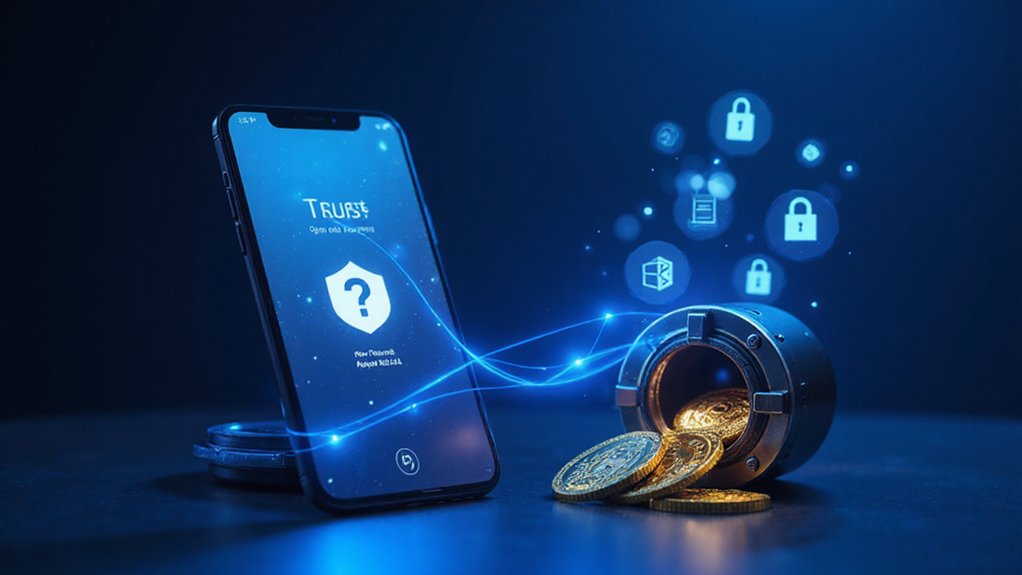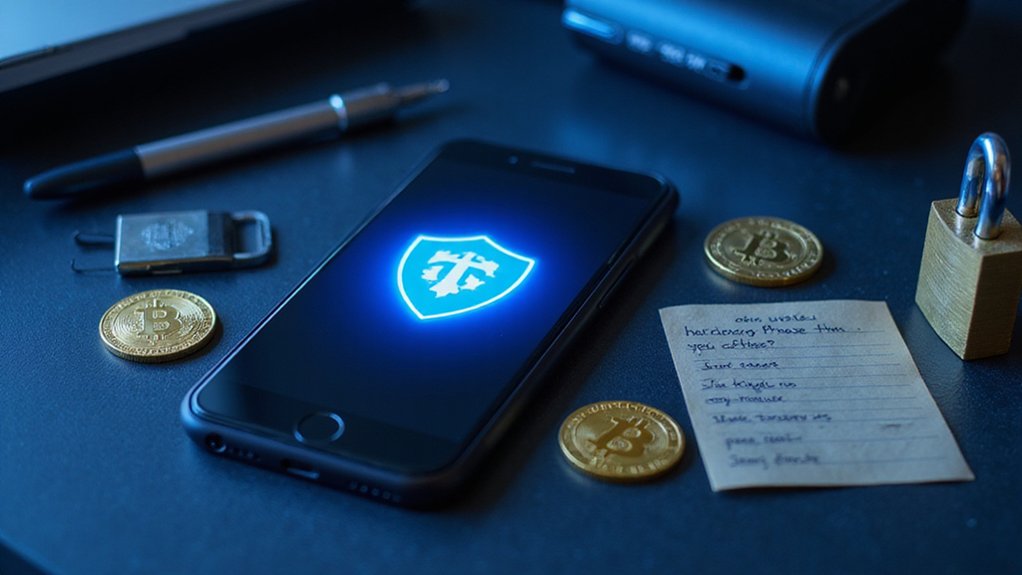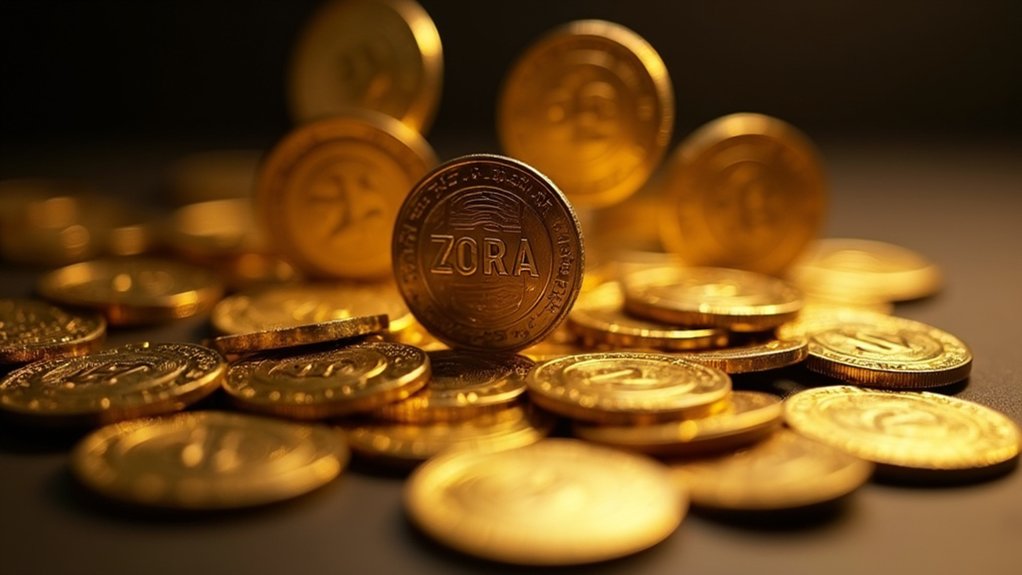Trust Wallet secures digital assets through a robust architecture combining local private key storage, biometric authentication, and military-grade AES encryption. Users maintain complete control via a 12-word recovery phrase (guard this with your life—seriously), while the app’s ISO 27001/27701 certifications validate its security practices. The Security Scanner assigns risk levels to transactions, flagging suspicious activities before disaster strikes. Hardware wallet integration offers additional protection for the particularly paranoid—which, in crypto, might just be prudent.

Why entrust your digital fortunes to anything less than fortress-level security?
In the high-stakes arena of cryptocurrency management, Trust Wallet distinguishes itself through an impressive arsenal of protective measures that would make even the most paranoid of security experts nod in grudging approval.
The platform’s ISO 27701 and ISO 27001 certifications—those bureaucratic badges of honor in the information security world—validate its adherence to international standards that most users acknowledge without fully comprehending their significance.
The wallet’s security architecture operates on multiple fronts simultaneously.
While competitors might offer singular protective measures, Trust Wallet deploys strong encryption protocols alongside continuous monitoring systems that remain vigilantly on guard. Trust Wallet’s open-source code allows community members to audit and improve security features, further strengthening its protective infrastructure.
Its bug bounty program (a clever outsourcing of security auditing to ethical hackers who receive compensation for identifying vulnerabilities) effectively crowdsources threat detection.
Unlike OKX Web3’s multi-chain capabilities that support numerous blockchains including Bitcoin, Ethereum, and Solana, Trust Wallet focuses primarily on its security framework rather than emphasizing cross-chain functionality.
Perhaps most vital to the discerning crypto investor is Trust Wallet’s approach to private key management.
Unlike custodial alternatives where third parties maintain possession of these digital skeleton keys, Trust Wallet stores private keys locally on the user’s device.
This arrangement—secured through a 12-word secret phrase that users must guard with near-religious devotion—ensures that control remains firmly in users’ hands¹.
Biometric authentication and PIN protection provide additional security layers that integrate seamlessly with device-native capabilities.
The implementation of AES encryption algorithms for private keys, coupled with tamper-proof key stores, creates a robust defense system against unauthorized access attempts.
For those requiring enhanced protection (institutional investors and the justifiably paranoid), Trust Wallet accommodates integration with hardware wallets while maintaining compatibility with external blockchain wallets.
The platform’s Security Scanner assigns risk levels to transactions, issuing proactive warnings about suspicious activities—a feature particularly valuable for novice users traversing cryptocurrency’s treacherous waters.
Regular independent audits, security updates, and thorough risk management strategies complete Trust Wallet’s security profile, offering users that rare commodity in digital asset management: a reasonable night’s sleep.
¹This responsibility, while empowering, comes with corresponding obligations that cannot be outsourced.
Frequently Asked Questions
Can Trust Wallet Recover My Assets if I Lose My Seed Phrase?
Trust Wallet cannot recover assets if a seed phrase is lost—a stark reality in the cryptocurrency landscape where conventional “forgot password” mechanisms are conspicuously absent.
No support team, regardless of their technical prowess, can circumvent this fundamental security feature.
The immutable nature of blockchain technology (which, ironically, constitutes both its greatest strength and potential Achilles’ heel for the careless user) means that without the seed phrase, one’s digital assets remain permanently entombed in cryptographic limbo.
Does Trust Wallet Work in All Countries Worldwide?
Trust Wallet operates in most countries globally, though with notable exceptions where cryptocurrency restrictions apply.
While the app itself has few geographic limitations, functionality varies greatly—particularly for buying and selling features, which are available only in select nations like the US, UK, and Japan.
Regions with stringent crypto regulations (China, perhaps unsurprisingly) may experience limited access, prompting some users to employ VPNs as workarounds.
The wallet’s 25+ language support further enhances its international accessibility.
Can I Connect Trust Wallet to Hardware Wallets for Extra Security?
Yes, Trust Wallet does support hardware wallet integration—primarily with Ledger devices.
This connection is available through the Trust Wallet browser extension (currently in beta), allowing users to maintain private keys offline while accessing Trust Wallet’s interface.
The synergy offers enhanced security: transactions initiated in Trust Wallet require physical confirmation on the hardware device.
While mobile app support remains somewhat limited, this integration represents the intersection of convenience and cold storage’s fortress-like protection for digital assets.
What Are the Fees for Transactions Within Trust Wallet?
Trust Wallet itself doesn’t charge service fees—a welcome anomaly in the fee-laden crypto landscape.
Users do, however, encounter network fees paid to blockchain validators, which fluctuate with congestion levels.
Ethereum transactions require gas fees that can oscillate wildly during peak periods.
While Trust Wallet sets ideal fees automatically, users may manually adjust them to prioritize transaction speed.
The wallet’s interface elegantly displays these variable costs, allowing for informed decisions based on urgency versus economy.
Can Multiple People Access the Same Trust Wallet Account Simultaneously?
Trust Wallet is fundamentally designed as a single-user application, making simultaneous multi-user access impossible by design (and prudently so).
While users can create up to 15 separate wallets within the app—each potentially serving different individuals—concurrent access would compromise the security architecture that makes self-custody meaningful in the first place.
The same wallet can be accessed across multiple devices, certainly, but the simultaneous multi-user scenario remains a conceptual non-starter in Trust Wallet’s security paradigm.









